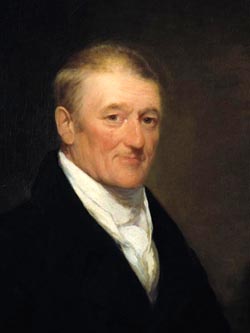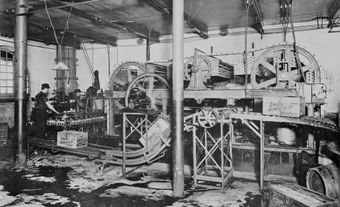John Molson, entrepreneur, politician, philanthropist (born 28 December 1763 near Moulton, Lincolnshire, England; died 11 January 1836 in Boucherville, Lower Canada). John Molson founded Canada’s oldest and largest brewery and introduced steamship travel in Canada. His investments in Montreal helped to transform the city from a colonial outpost to a cosmopolitan centre. Today, the brewing business he founded continues as part of Molson Coors Beverage Company.

Early Life
John Molson was the eldest of five children of John Molson Sr. and Mary Elsdale. Molson was an orphan by the age of eight: his father had died in 1770, his mother in 1772. Molson was left to the care of his grandfather, who rented out the family estate, Snake Hall, and used the money to pay for Molson’s care and education and pad Molson’s eventual inheritance.
At the age of 17, Molson suffered from an unknown illness. His doctor recommended time at sea to help restore his health. Molson decided to sail to Canada, which he viewed as a land of opportunity. His grandfather objected, but his uncle, renowned privateer Robinson Elsdale, encouraged him. He set sail for Quebec on 2 May 1782. Rough seas and a delinquent captain forced Molson to abandon his original ship and complete the journey on a British navy vessel. He ultimately arrived safely in Montreal in late June or early July.
Molson’s Brewery
In Montreal, John Molson connected with Thomas Loid, a family friend from England. Loid had set up a small brewery on the banks of the St. Lawrence, on the outskirts of Montreal. Historically, beer was not popular in the city. In the wake of the American Revolutionary War, however, an influx of Loyalists and a garrison of British troops increased demand for beer. Recognizing an opportunity, Molson partnered with Loid in 1783, using money from his inheritance. Their partnership would not last long. A year later, Molson sued Loid for an outstanding debt. He was eventually awarded full control of the brewery and bought most of its assets in an auction later that year. The lawsuit was probably a way to transfer ownership to Molson while avoiding creditors. Molson may have continued to live with Loid throughout the proceedings, and Molson and his associates were the only people to bid on the brewery’s assets.
In 1785, Molson returned to England to settle his estate. While there, he acquired the book Theoretic Hints on an Improved Practice of Brewing Malt-Liquors by John Richardson, which he read on the return voyage in the spring of 1786. With his new-found knowledge and full inheritance, he expanded the brewery in 1787. As the only local brewery, Molson’s quickly proved popular and profitable. Its fortunes grew further after 1789, when the French Revolution and subsequent unrest in Europe virtually cut off the international supply of beer. In 1795, Molson expanded again and began producing 54,000 gallons of ale, beer and spruce beer annually.
Did you know?
John Molson’s descendants have run the family brewing business for seven generations. In 2005, near the end of Eric Molson’s five-decade career with the company, the brewery merged with US-based Coors to form Molson Coors Brewing Company (as of 2020 Molson Coors Beverage Company). Eric’s sons Andrew and Geoff followed in his footsteps as directors of the company’s board.
Business Empire
By 1791, John Molson was known and respected enough to be a member of the local Masonic order, and he regularly contributed to philanthropic causes. Though he continued to expand the brewery throughout his life, he turned his attention to many other businesses and causes. Most notably, he and two business partners brought steamships to Canada. On 1 November 1809, he launched the Accommodation, which ran on the St. Lawrence from Montreal to Quebec City. He expanded his fleet steadily, eventually running a monopoly on steam travel along the St. Lawrence, the Ottawa River and the Rideau Canal. Molson later helped fund Canada’s first railroad, but he died before it was completed.
The success of the steamship service led him to build a hotel and wharf on the Montreal waterfront. The Mansion House Hotel was the centre of Montreal society until it burned down in 1821. Its replacement was seen as the grandest hotel in Canada until it also burned down in 1832. In 1825, Molson helped found the Theatre Royal, which brought international performers to Montreal.
Motivated by problems he had securing permission to build the wharf and a desire to represent the interests of Quebecers, Molson entered politics in 1816. He served in Lower Canada’s House of Assembly until 1820, when he did not seek re-election. He became president of the Bank of Montreal in 1826 and served as chair of the Montreal General Hospital in 1831. Molson also provided significant capital to Montreal General. In 1832, he was appointed to the Legislative Council, an advisory board that served the governor general, Lord Aylmer. A seat on this council was among the most powerful political positions in the country at the time.
Family Life
John Molson met Loyalist Sarah Vaughan in 1786. They began living together shortly after. Though they were not legally married until 1801, they had three children together: John Jr. in 1787, Thomas in 1791 and William in 1793. Vaughan died in 1829.
Molson encouraged his children to become involved in his businesses. He formed a series of partnerships with his sons beginning in 1816. Molson worked well with his sons, but after his death on 11 January 1836, trouble interpreting his will led to legal action between the brothers.
Legacy
John Molson’s death was a significant event, with obituaries in all the major Quebec papers. The French-language Le Canadien claimed “few men have rendered better service to their country in connection with its material development.”
In 2021, the Government of Canada designated Molson a person of national historic significance under the National Program of Historical Commemoration.

 Share on Facebook
Share on Facebook Share on X
Share on X Share by Email
Share by Email Share on Google Classroom
Share on Google Classroom




